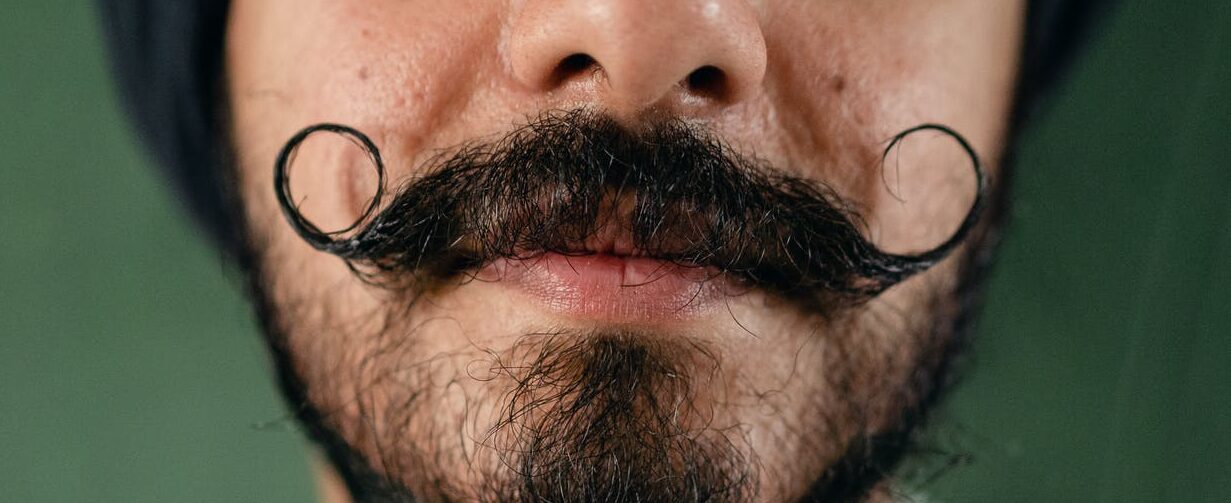Please note that some of the links below are affiliate links and I will earn a small commission if you purchase through those links.
Since September 5th is Beard Day, I thought I dive a bit into the depths of beards. Obviously, facial hair has been around since the dawn of humans but just like clothing, hair styles, and make-up it has undergone different trends and styles.
Men have used beards (and hair and wigs and clothing) to show their status and their wealth. A bearded man can appear manly, intimidating, wise, common, or poor depending on the circumstances and perceptions of the time. If a man is clean shaven or has groomed facial hair he will appear of a higher status since he has the resources to take care of himself.
On the other hand, he might appear effeminate or weak since facial hair indicates maturity and without a beard he can’t hide his weak chin or other facial flaws. Trends, styles, acceptance and perception change over time and with the times, as you can see in the following video:
Until one of my students gave a presentation about the World Beard and Moustache Championship I had no idea this kind of competition existed and that it probably originated in Germany. Different cities lay claim to being the city to have hosted the first Championship but it seems to be most likely the First Höfener Beard Club (1. Höfener Bartclub) in Höfen/Enz, Germany was the first in 1990. Since 1995, the competition takes place every two years in different cities.

Of course I know the main kinds of beards: der Vollbart (full beard), der Schnurrbart (moustache), which is also called der Oberlippenbart (upper lip beard), der Schnauzer or Schnäuzer (from Schnauze – snout, muzzle) or more recently der Moustache, die Koteletten (sideburns), and der Henriquatre (goatee). There are many more names for a lot of different and often very specific styles.
In the championships, men compete in the following categories: Moustache, Partial Beard, Full Beard. There are many subcategories like the Hungarian Moustache, the Natural Full Beard, the Fu Manchu, Sideburns, and many more. In 2017, the championships took place in Austin, Tex, and in 2019 the competitors met in Antwerpen, Belgium. The championship 2021 was supposed to be held in Auckland, New Zealand but it has been postponed. However, the National Beard and Moustache Championship in the US will take place. It is scheduled for September 10th and 11th in Scranton, Pa.
Take a look at this video of the World Beard and Moustache Championship from 2013.
German words and expressions around facial hair
- rasieren – to shave
- zwirbeln – to twirl
- föhnen – to blow dry
- schneiden – to cut
- trimmen – to trim
- der Rasierer (-), der Rasierapparat (-e) – razor
- die Rasur (-en) – the shave
- die Bartpflege (-n) – beard care
- seinen Bart stutzen – to trim one’s beard
- der Barbier (e) (old), der Herrenfriseur (-e) – barber
- die Bartschere (-n) – beard scissors
- das Bartöl (-e) – beard oil
- die Bartpomade (-n) – beard pomade
- das Haarspray (-s) – hair spray
Idiomatic Expressions
Was murmelst du in deinen Bart? What are you mumbling into you beard? When you are speaking unclearly you are mumbling or muttering into your beard.

When somebody is telling a story for the hundredth time or a joke that everybody knows you can say Der Witz hat so einen Bart (The joke has such (a long) beard) and show how long that beard is. It basically means that the story or joke is old, known and out of style. It started when full beards were no longer in style in the middle of the 20th century and were considered old fashioned.

Der Bart ist ab! means the beard is gone or something is over. Supposedly, this saying started when Kaiser Wilhelm II. didn’t wear a full beard like his father when he became emperor of Germany in 1888. His beard is an eagle spreading his wings and Wilhelm II wanted to be the face of a new, dynamic, and self confident Germany.
Do you have any sayings or expressions with facial hair in your language? What’s your favorite beard style? Would you want to participate in the competition?
Sources and Further Readings
- https://www.worldbeardchampionships.com/
- https://www.spiegel.de/fotostrecke/bart-weltmeisterschaft-in-antwerpen-bart-an-der-grenze-fotostrecke-168723.html
- https://www.spiegel.de/fotostrecke/geschichte-der-bartmode-von-1860-bis-heute-fotostrecke-107659.html
- https://www.dw.com/de/internationale-bart-weltmeisterschaft-2013/g-17201867
- https://www.welt.de/vermischtes/kurioses/gallery13373628/Die-kuriosen-Auswuechse-der-Bart-Weltmeisterschaft.html
- https://www.worldbeardchampionships.com/history
- https://www.insider.com/national-beard-moustache-championship-photos-2018-11#but-sometimes-simplicity-is-just-as-stunning-7
- https://www.beardgrowthworld.com/beard-and-mustache-competition/ (A guide about the different categories, how to enter the championship, how to prepare)
- https://www.youtube.com/watch?v=To2JBuFR2VQ (The Alaskan competition Mr. Fur Face)


